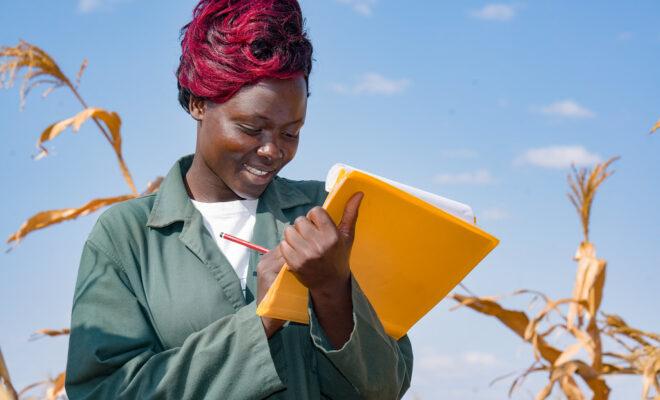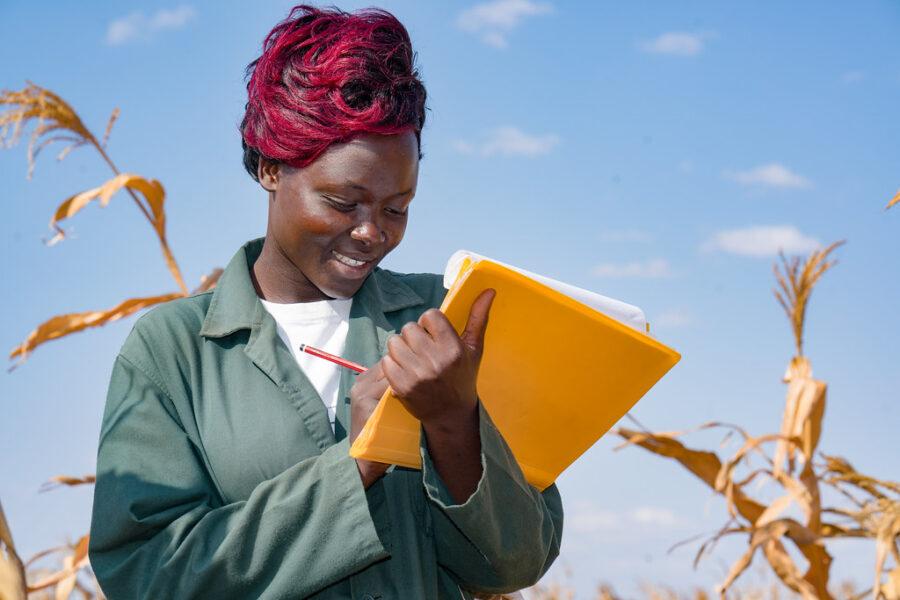Young Africans are fleeing farming. Agritech can bring them back

Innovative new technologies can make smallholder farming more profitable and exciting for a new generation, but they need investment.

Field technician Maurene Adhiambu records data in Kenya. Credit: CIMMYT/Peter Lowe.
As communities in Africa start to rebound from the initial impacts of coronavirus pandemic and look ahead, the importance of creating millions of jobs for the continent’s booming youth population cannot be overstated. This will require concerted efforts across myriad sectors, but one that is brimming with vast and untapped resources is agriculture.
I hear a lot of dire warnings about the food situation in Africa, and there are indeed many reasons to be concerned. The pandemic disrupted supply chains, upending many farmers’ precarious livelihoods that are already being hit hard by the climate crisis in new and unsettling ways. It’s easy to think that we are on an unalterable path toward a crisis of food security in Africa, but I know that doesn’t have to be the case.
The future of food on the continent is in the hands of African farmers, particularly our young farmers of whom we are in desperately short supply. About 60% of Africans are under 25 years old, but the average age of Africa’s smallholder farmers is over 60. Too many young people view farming as exhausting work with antiquated tools for very low pay. You rarely hear under 30s say “I want to be a farmer” and many parents shudder at the thought of their children going into agriculture. Yet if we are going to secure a sustainable future of food in Africa, these things need to change. We need to show agriculture can be a major source of jobs for the future.
A report last month released by Heifer International reveals why youth are turning away from agriculture and highlights a major opportunity to evolve the sector and bring them back. The survey, which drew responses from some 30,000 young people across 11 African countries, found that only about 1 in 4 young farmers has access to the kinds of agricultural technologies that are transforming food production around the world. These “agritech” tools include things like digital sensors that monitor soil health and digital platforms that connect farmers with market opportunities, technical advice and high-quality inputs. The fact that many young African farmers lack access to these kinds of tools puts them at a severe disadvantage.
The report also found that with the appropriate financing, training and access to technologies, many more African youth would seriously consider pursuing a career in agriculture. The survey, which included focus groups with farmers and tech companies, revealed evidence of a rapidly growing cadre of agritech start-ups operated by creative, young people across the continent. By encouraging and supporting this new generation of innovators, we can boost access to labour-saving and transformative technologies for huge numbers of smallholder farmers.
These young, innovative entrepreneurs understand the farming struggles of their parents’ generation. But they also believe farming can provide a promising future for their own generation. In Ethiopia, a group of young engineers is providing drone services for analysing farm performance and a mobile application to help farmers detect crop disease. A start-up in Nigeria is using machine learning to guide farmers from seed to market, helping them choose what to grow, how to grow it and where to sell it. And farmers from Senegal to Kenya can sign on to receive SMS alerts on important weather updates, market insights and farming advice.
With these kinds of tools and technologies, young African farmers could better manage, or even avoid, many of the challenges they reported in the survey, from climate shocks to crop pests and disease. These technologies have the power to make smallholder farmers much more productive, profitable and sustainable – and to make food production more exciting and attractive for a new generation.
Financing and supporting these companies are powerful ways of creating a virtuous circle in African agriculture: successful youth-led agritech companies lead to more successful young farmers and a more dynamic and profitable agricultural sector. Their success then creates an even bigger market opportunity for agriculture innovators that encourages more investors to get involved.
But this future will not just magically appear. Governments and businesses alike need to invest in African farmers and encourage them to develop and adopt agritech innovations. The need for this investment grows more urgent every day. Our survey revealed that during the pandemic some 40% of agricultural organisations supporting smallholder farmers were forced to close at least temporarily, while more than a third lacked the capital they needed to recover.
The pandemic has exacerbated an already difficult situation for African farmers, with climate change looming as a bigger threat. But when I talk to the young people running African agritech firms, I detect no sense of gloom. These young people exude energy, ideas and optimism. They represent an entire generation that has the potential to transform African agriculture for the better. That gives me hope for the future. In a time filled with hardship, we should embrace their vision and make it our own.





